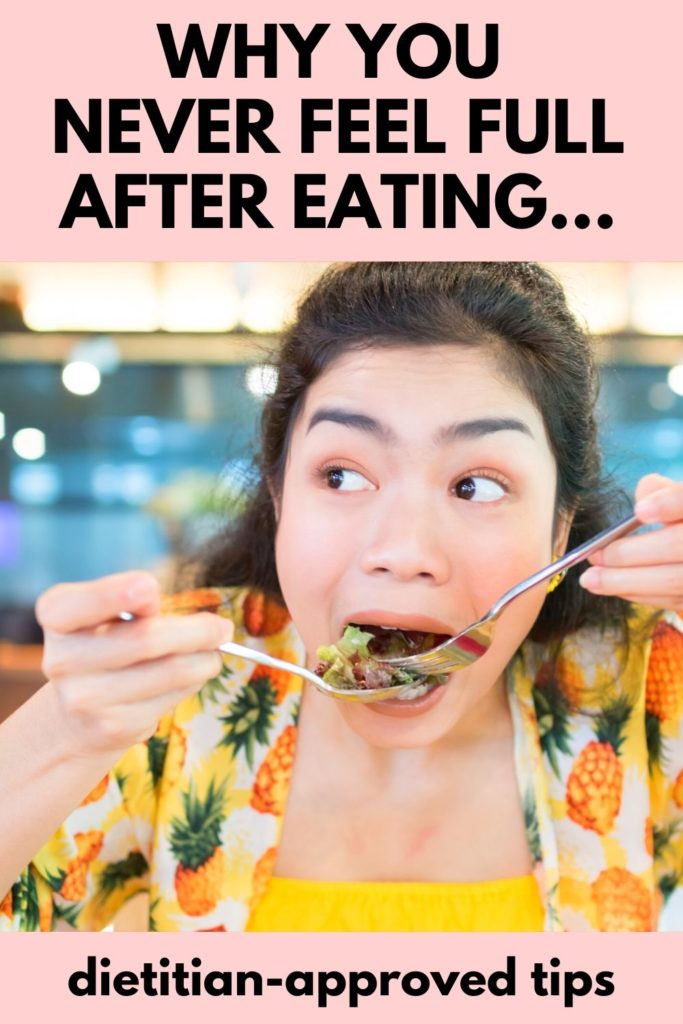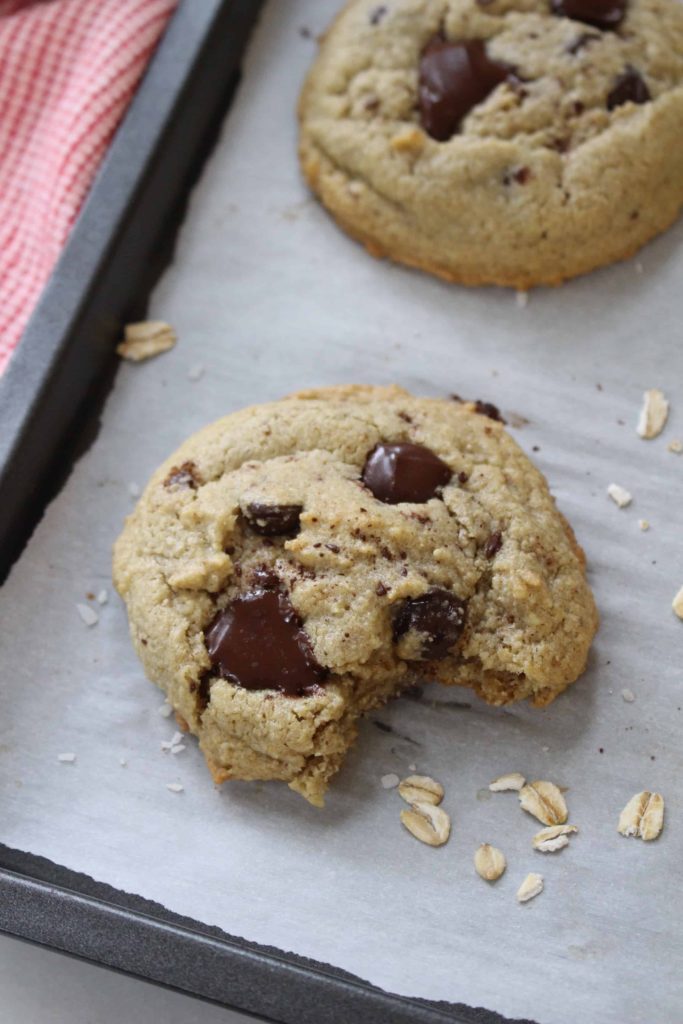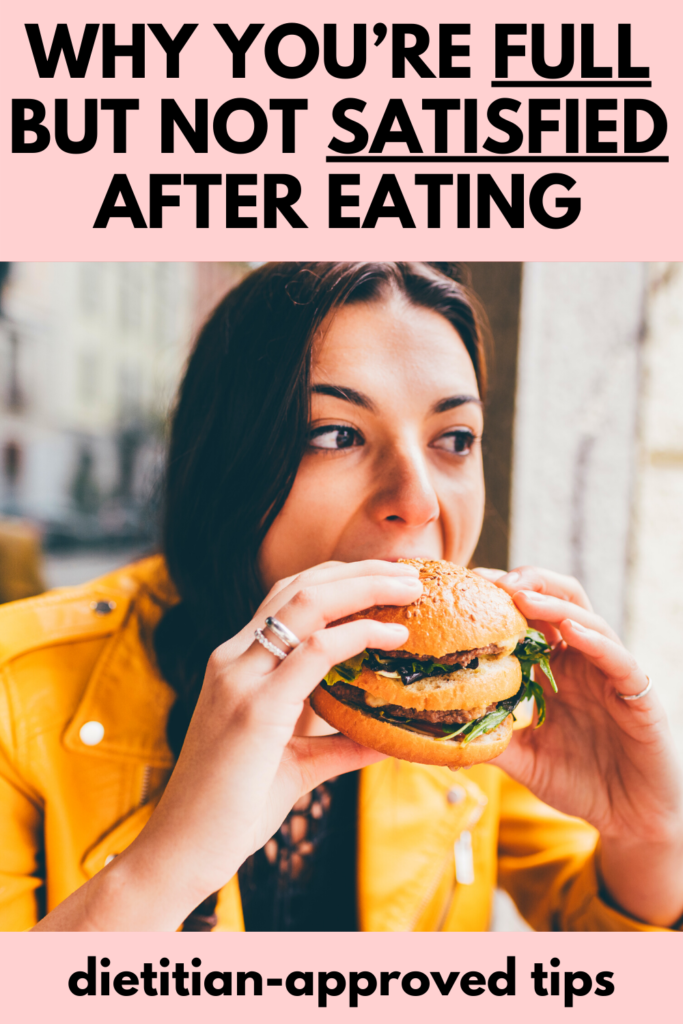Why Do I Never Feel Full After Eating?
If you never feel full after eating you may not be truly satisfied from your meals. There’s a big difference between fullness and satisfaction, so let’s talk about it…

Years ago I was given a gift I didn’t even know I needed. And it wasn’t a gift at the time, but looking back, it was the best thing that could happen to me because it definitely helped improve my relationship with food.
For five years after college I was actually very sick. My body was in what doctors call a “hypermetabolic state,” meaning my metabolism was super ramped up trying to fight rare lung infections that I had.
For the first time in my life I could eat whatever I wanted and my weight didn’t change. This was a stark contrast to me micromanaging my weight to keep it low (and inevitably re-gaining those 15-20 pounds on and off throughout college).
Since I could eat whatever I wanted without worrying about my body size after years of dieting on and off, I really learned how to listen to my body and eat what it wanted.
When my body size was taken off the table I was finally able to tune into my body’s innate wants and needs.
Especially being sick at the time, I wanted to eat in a way that feels good. And now I’m able to teach my clients this way of eating.
But one of the key lessons I learned from living in this constant state of sickness for 5+ years was how to eat in a way that was satisfying.
I didn’t just eat to get full, but I actually was able to eat what I was in the mood for because I wasn’t trying to keep my calories as low as possible (for once).
I stopped overeating and feeling out of control around food. So while I was in grad school for nutrition, a lightbulb went off…
Is satisfaction the key to stop binging? Is eating enough the key to stop feeling out of control around food?
As simple as it sounds now, YES, eating enough and being SATISFIED from your food is truly essential to find ultimate food freedom.
Now, this is what refer to as the S-Factor, as you can read about in my ebook Thrive in 5.
So if you’re asking yourself “Why Do I Never Feel Full After Eating?” a lack of satisfaction may be your answer!

What’s the difference between fullness and satisfaction?
Being full is a physical feeling. Your stomach fits about 4 cups of food. As you eat, your stomach stretches, which sends signals to your brain that you’re full.
But if you’re full on all veggies, you may not be satisfied if you were really in the mood for a burger. So you’re mentally still hungry even though your belly is full.
In order to be satisfied, your brain cannot be hungry any more. You have to eat what you’re in the mood for. Obtaining satisfaction means you no longer want food because you ate exactly what it is you wanted. Not only is your belly full, but your brain is too.
Why is satisfaction so important?
Satisfaction is so important for individuals who struggle with their relationship with food, binging, constant dieting, restricting and then overeating, and so much more because it helps quiet the out of control feelings around food.
Benefits of Eating Satisfying Meals if You Never Feel Full After Eating
There are several key benefits of eating satisfying meals if you never feel full after eating:
- You’ll stay full longer
- You’re not constantly thinking about food
- Your cravings diminish
- You stop looking for food after you finish a meal
- You stop restricting yourself and eat what you’re in the mood for
- Binges lessen
Everyone will reap different benefits from eating satisfying meals. Most notably, eating satisfying meals can help reduce cravings and binges and help you stop thinking about food so often.
Here’s an example with my client Jennifer…
Jennifer came to me eating a healthy diet, always trying to be “good.” After years of dieting, she was frustrated that she started binging almost every night during the pandemic. Her anxiety skyrocketed, and she expressed that through eating food she loved. Jennifer would wake up in the morning and feel bloated and blah, so she’d “get back on track” and eat low carb “good” meals.
But for months, Jennifer couldn’t stop the binges at night. When we first started working together, Jennifer was balancing her plate and trying to listen to her hunger cues. But that wasn’t enough.
After realizing that her meals during the day weren’t nourishing enough and not necessarily what she was in the mood for, Jennifer started prioritizing satisfaction and eating when she was hungry. In conjunction, these two priorities helped slowly reduce her nightly binges.
What happened to Jennifer is SO common amongst my clients. And it’s based in actual science. When you don’t eat enough your body will find a way to compensate.
If you’re mentally hungry (AKA not satisfied), your body will also try to compensate. Oftentimes this is through binging later in the day.
Three months after working together Jennifer reported she was:
- Binge-free
- No longer thinking about food all day long
- Able to eat what she wanted (which felt amazing!)
3 Steps to Boost Satisfaction From Your Meals If You Never Feel Full After Eating
If you’re ready to boost your satisfaction from your meals, listen up…
Here are 3 steps to get started:
- Think about what you’re in the mood for – don’t just eat on autopilot, when possible
- Eat a variety of nutrients
- Eat when you’re hungry and stop when you’re full
Let’s break this down…
1. Think about what you’re in the mood for – don’t just eat on autopilot, when possible
The first step in eating satisfying meals is to identify what you’re actually in the mood for.
Stop eating a salad for lunch everyday if you don’t actually want a salad.
Stop forcing yourself to eat boring grilled chicken and steamed broccoli for dinner if it doesn’t sound good to you.
A healthy diet isn’t eating as little as possible.
We watch a lot of Sesame Street in our house and Cookie Monster is always told to “Stop and think it through.” This is exactly what you should do too! Pause before you prepare your food and think about what sounds good.
Even if you’re a big meal planner and meal prepper, you can still make some tweaks to make your meals more appealing to you:
- Add a different sauce (if you planned on red sauce, maybe switch to pesto)
- Stock your fridge with salad dressings and dips (guacamole, salsa, hummus, etc. can all add flavor and satisfaction to your meals)
- Leave room in your plan for flexibility. If nothing sounds good, try ordering in or getting takeout, if you can.
It’s a privilege to be able to have satisfying meals. If you can’t have satisfying meals 100% of the time, that’s reality and ok (see below for more on this).
2. Eat a variety of nutrients
There’s a reason I love a balanced plate – it’s more satisfying to eat a combination of carbs, protein, and fat.
Think about it… Remember the last time you cut out carbs from your diet. How did you feel?
- Did you have more cravings?
- Were you always looking for something else to eat?
- Did you binge later in the day/week?
- Were you thinking about food more?
- Were you less than satisfied?
Eating a combination of nutrients is more satisfying, but also helps balances your blood sugar. Instead of eating carbs on their own, pairing with protein and/or fat helps your blood sugar rise slowly and then fall at a slower rate. This is what we want instead of sharp spikes and quick drops.
3. Eat when you’re hungry and stop when you’re full
Food tastes better when you’re hungry. So instead of “forcing” yourself to eat dessert when you’re truly full after a meal, maybe wait until you’re ready to eat again. It will taste better.
Just the other day I baked Oat Flour Chocolate Chip Cookies (recipe coming soon!). I went to photograph them at about 12pm, after I had a snack, so I wasn’t too hungry. I was also really in the mood for the lunch I had planned (a salad with tuna and roasted veggies, which is one of my favorite lunches).
When photographing the cookies, I took a bite (for the pics) and it honestly wasn’t that appealing. Although the cookies are DELISH, I wasn’t in the mood for a cookie because I wasn’t hungry enough and wasn’t remotely in the mood for something sweet.
The old me would have eaten the cookie because it tasted good. The now me knows that I can eat a cookie at any time. I knew to wait until it was a satisfying eating experience to help cut cravings.
But not every meal will be the most exciting or satisfying meal experience…
It’s just not possible!
Whether it’s financial constraints, timing, or the business of life, not every meal will be the most satisfying meal.
Instead, start with having one meal or snack per day that’s truly satisfying. As you can, add another meal or two per week that’s truly what you’re in the mood for and take note of how your body feels.

So if you never feel full after eating…
If you never feel full after eating, a lack of satisfaction may be the answer. Focus on building satisfying meals for a week and see how you feel.
If you’re looking for more detailed support, complete my coaching application so we can work together to help you feel good from food!
XO


 Hi there!
Thanks for stopping by! I'm Chelsey, an online Registered Dietitian, recipe developer, budding photographer, and coffee addict! My mission is to help you feel good through food by answering the question "What should I eat?" Let's make nutrition approachable!
I hope you enjoy my personal collection of simple, healthy, food allergy friendly and nutritiously delicious recipes, plus tips and tons of tricks that will help YOU live a nutritionally-balanced life! I look forward to getting to know you better...
Hi there!
Thanks for stopping by! I'm Chelsey, an online Registered Dietitian, recipe developer, budding photographer, and coffee addict! My mission is to help you feel good through food by answering the question "What should I eat?" Let's make nutrition approachable!
I hope you enjoy my personal collection of simple, healthy, food allergy friendly and nutritiously delicious recipes, plus tips and tons of tricks that will help YOU live a nutritionally-balanced life! I look forward to getting to know you better...







